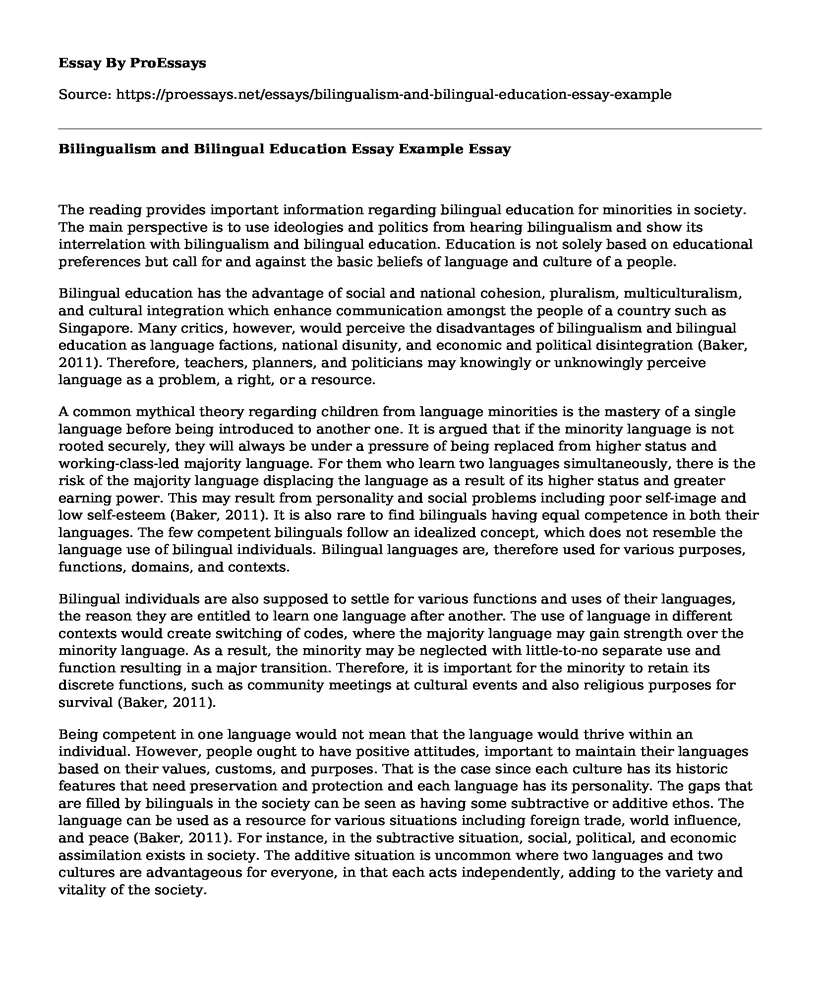The reading provides important information regarding bilingual education for minorities in society. The main perspective is to use ideologies and politics from hearing bilingualism and show its interrelation with bilingualism and bilingual education. Education is not solely based on educational preferences but call for and against the basic beliefs of language and culture of a people.
Bilingual education has the advantage of social and national cohesion, pluralism, multiculturalism, and cultural integration which enhance communication amongst the people of a country such as Singapore. Many critics, however, would perceive the disadvantages of bilingualism and bilingual education as language factions, national disunity, and economic and political disintegration (Baker, 2011). Therefore, teachers, planners, and politicians may knowingly or unknowingly perceive language as a problem, a right, or a resource.
A common mythical theory regarding children from language minorities is the mastery of a single language before being introduced to another one. It is argued that if the minority language is not rooted securely, they will always be under a pressure of being replaced from higher status and working-class-led majority language. For them who learn two languages simultaneously, there is the risk of the majority language displacing the language as a result of its higher status and greater earning power. This may result from personality and social problems including poor self-image and low self-esteem (Baker, 2011). It is also rare to find bilinguals having equal competence in both their languages. The few competent bilinguals follow an idealized concept, which does not resemble the language use of bilingual individuals. Bilingual languages are, therefore used for various purposes, functions, domains, and contexts.
Bilingual individuals are also supposed to settle for various functions and uses of their languages, the reason they are entitled to learn one language after another. The use of language in different contexts would create switching of codes, where the majority language may gain strength over the minority language. As a result, the minority may be neglected with little-to-no separate use and function resulting in a major transition. Therefore, it is important for the minority to retain its discrete functions, such as community meetings at cultural events and also religious purposes for survival (Baker, 2011).
Being competent in one language would not mean that the language would thrive within an individual. However, people ought to have positive attitudes, important to maintain their languages based on their values, customs, and purposes. That is the case since each culture has its historic features that need preservation and protection and each language has its personality. The gaps that are filled by bilinguals in the society can be seen as having some subtractive or additive ethos. The language can be used as a resource for various situations including foreign trade, world influence, and peace (Baker, 2011). For instance, in the subtractive situation, social, political, and economic assimilation exists in society. The additive situation is uncommon where two languages and two cultures are advantageous for everyone, in that each acts independently, adding to the variety and vitality of the society.
Conclusion
I have been a victim of perceiving minority languages as a challenge in my language, provided the fact that I am in the majority language category. I find myself expecting cultural and structural assimilation from the minorities, which should, however, be limited economically (Baker, 2011). I have, however, seen the mass media amongst other socialization forces strain to place pressure on the language minority communities to encourage a transition towards majority language and culture.
References
Baker, C. (2011). Bilingualism and Bilingual Education as a Problem, Right and Resource. Foundations of bilingual education and bilingualism (pp. 374-383). Multilingual Matters.
Cite this page
Bilingualism and Bilingual Education Essay Example. (2022, Dec 06). Retrieved from https://proessays.net/essays/bilingualism-and-bilingual-education-essay-example
If you are the original author of this essay and no longer wish to have it published on the ProEssays website, please click below to request its removal:
- Essay Example: PowerPoint and a Student's Academic Performance in the Classroom
- Romantic Motivation Among Different Students Paper Example
- High Pressured Situations and Leadership Paper Example
- Essay Sample on Child Punishment at Early Childhood
- Essay Example on School Uniforms, Discipline, and Performance
- Understanding External Triggers and Psychological Effects of Electronic Addiction - Free Report
- Free Paper Sample: Why People Should Attend Online School







